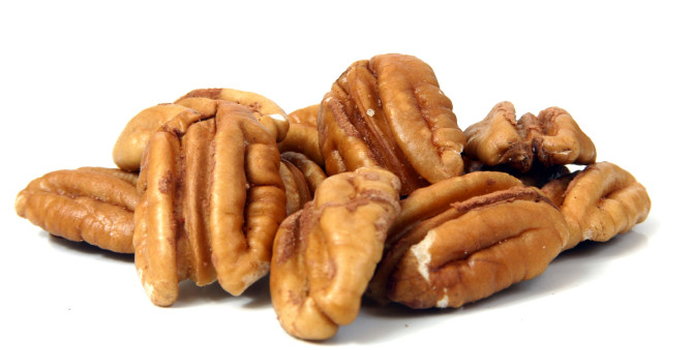Pecans, walnuts, almonds and hazelnuts are all examples of healthy nuts. These nuts are nutritionally dense with a wide variety of essential fatty acids, proteins, vitamins and minerals. Pecans are one of the top 15 food sources of antioxidants, and are especially celebrated for their ability to reduce your blood cholesterol level and prevent heart diseases.
Calories and Weight Control
If you are on a weight loss diet, it's best not to over-indulge on pecans. They are considered to be a high-calorie food and contain a significant amount of fat. One ounce of pecans (about 20 halves) contains approximately 199 calories and 21 grams of fat. So if you are trying to lose some extra pounds, you should not eat more than 10 pecan halves in one sitting. The best way to satisfy your cravings without feeling guilty is by counting out 5 to 8 pieces of pecan halves. Break them into smaller bits, and sprinkle them on top of your nonfat yogurt or your salad. Pecans also go very well with sugar-free or fat-free chocolate puddings.
Healthy Fats for Your Heart
Out of the 21 grams of fat contained in an ounce of pecans, only 2 grams are saturated. The rest of the fat content is a combination of monounsaturated and polyunsaturated fats. These fats are great for maintaining your cardiovascular health.
- Oleic acid: This is the monounsaturated omega-9 fatty acid found in pecans. Oleic acids can help dissolve the fatty deposits on your blood vessels, effectively preventing arterial blockage and reducing your risks for strokes and heart attacks. Some evidence also shows that oleic acid can help lower your blood pressure.
- Linoleic acid: Pecans are extremely rich in this omega-6 fatty acid, which can provide you with a whole list of health benefits. They have antioxidant and anti-inflammatory properties that keep your skin, muscles and your blood vessels well conditioned so that they are more resilient to stress. Increased intake of linoleic acid can help prevent arterial thrombosis.
- Alpha linolenic acid (ALA): This is the vegetarian omega-3 fatty acid that occurs in pecans. ALA has the ability to lower cholesterol and can help control your blood pressure. Studies have also shown that ALA is a strong anti-cancerous agent, and it is especially effective against prostate cancer.
Phytosterols to Optimize Cholesterol Level
The phytosterols in pecans is one of the primary reasons why these nuts are so valuable to your health. They are the best cholesterol reducing nutrient available in nature. Physterols inhibit your synthesized cholesterol and your dietary cholesterol from entering your bloodstream. Higher intake of phytosterols can significantly reduce your plaque forming low density lipoproteins (LDL) as well as your total blood cholesterol. Studies have also proved that phytosterols can increase your serum high density lipoproteins (HDL), which are the good cholesterol that protect you against coronary heart diseases.
Manganese, a Super Antioxidant
One ounce of pecans gives you 55% of your recommended intake value of manganese. This trace nutrient is a powerful antioxidant that can help strengthen your immunity and protect your nerve cells from free-radical damage. Sufficient intake of manganese is mandatory for proper nerve conduction and brain function.



